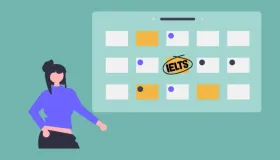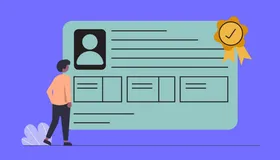IELTS Academic: Who Should Take it?
The IELTS Academic test is designed for students who need to demonstrate their English language proficiency in an academic setting.
Are you wondering if you’re eligible for the IELTS Academic test?
Then yes, IELTS Academic is best in your portfolio if you’re planning to study in a foreign university, whether for the admission process, attending lectures, applying for scholarships, or conversing with native people.
Key highlight:
Elements | Information |
| No.of Sections | 4 |
| Name of the Sections | Listening |
| Writing | |
| Speaking | |
| Reading | |
| The total duration of IELTS | 2 hours 40 mins |
| Fees of IELTS Academic | INR 17,000 |
| Modes of Exam | Computer-based / Test centre based |
Let's first discuss the IELTS academic format to better understand the exam.
IELTS Academic Pattern
There are 4 modules in IELTS Academic: Reading, Writing, Listening and Speaking.
Did you know?
The Writing, Reading, and Listening sections are on the day of your test booking, while you can schedule your Speaking section online for your preferred date and time. If you don't choose a slot in time, one will be assigned to you automatically.
Section | Time |
| Listening | 30 mins |
| Reading | 60 mins |
| Writing | 60 mins |
| Speaking | 11-14 mins |
| Total duration of the section | 2 hrs 40 mins |
Understanding the sections of the IELTS Academic test and recognising their significance is crucial for being well-prepared, confident, and capable of achieving the highest possible score. This, in turn, enhances your prospects for success in academic or professional pursuits.
Let's discuss each section in detail about its question type, duration of the task and number of tasks in each section:
IELTS Academic Listening (30 mins)
You need to listen to four recordings and then answer questions about them. You can only listen to each recording once.
- Recording 1: You'll hear a conversation about daily life.
- Recording 2: You'll hear a speech about everyday life or social issues, like a talk about the condition of streets in a neighbourhood.
- Recording 3: You'll hear a discussion among more than two people in an educational context, such as a teacher talking with students about an assignment.
- Recording 4: You'll hear a speech on an academic topic, like a lecture at a college.
IELTS Academic Reading (60 mins)
The IELTS Reading test requires you to answer 40 questions and is designed to test you on an array of reading skills. You would have to read for gist, main ideas, details, logical arguments, skimming, and figuring out the writers’ attitudes, opinions and intentions.
The Reading test in IELTS Academic is divided into three parts, each featuring a comprehensive passage from:
- contemporary books
- journals
- magazines
- and newspapers.
These passages reflect topics relevant to academic and professional environments in English-speaking contexts.
Types of Questions in the IELTS Academic Reading section are:
- Short answers,
- Matching headings
- Sentence endings
- Identifying specific information
- Completing sentences
- Summaries
- Notes
- Tables
- Flow charts.
IELTS Academic Writing (60 mins)
The IELTS writing test includes 2 tasks and covers general topics based on the module you're taking.
If you're doing the Academic test, you may need to write a report based on information from a chart, graph, table, map or structural drawing.
You may also need to summarise changes shown in two maps or drawings from different times.
To respond well to these Task 1 visuals:
- Focus on understanding the main trends and important differences instead of describing all the data.
- Look for specific details based on the type of graphic in the test. Charts, graphs, and tables may compare data at one moment or over a fixed period.
- When analysing a graphic, make sure you understand the data being presented.
To respond well to these Task 2 essay writing:
- It's important to carefully analyse the question and clearly express your opinion.
- Plan your essay before writing, and use appropriate examples and evidence to support your points.
- Remember to follow the proper essay structure with an introduction, body paragraphs, and a conclusion.
IELTS Academic Speaking (11-14 mins)
The IELTS Speaking test is designed to evaluate your spoken English skills and is divided into three parts.
- Part 1: Introduction and Interview (4–5 minutes)—In this part, the IELTS examiner introduces themselves and asks you to introduce yourself while also confirming your identity.
You will be asked general questions about family, studies, work, and your interests.
- Part 2: Individual Long Turn (3–4 minutes) - You will be given a cue card with a topic and some key points to cover in your speech. You will have one minute to prepare, during which you can take notes on the provided paper with a pencil.
After this, you will have between one and two minutes to speak on the topic, followed by some related questions from the examiner.
- Part 3: Two-way Discussion (4–5 minutes) - The examiner will ask further questions related to the topic from Part 2, giving you the opportunity to discuss additional ideas.
IELTS Academic Scoring Criteria
The IELTS Academic test is scored based on four sections: Listening, Reading, Writing, and Speaking.
Each section is scored on a band scale from 0 to 9. The overall band score is the average of the four individual scores.
Did you know?
The validity of IELTS academic scores typically lasts for two years from the date the test results are issued. This means universities and institutions will generally accept your IELTS score for admission purposes for two years after you take the test. |
The criteria evaluate your ability to comprehend a range of accents and academic language, as well as to effectively convey ideas in writing and speaking.
Here's an in-depth look at the scoring criteria for each section:
1. Listening and Reading
For the Listening and Reading sections, each consists of 40 questions. Your raw score, or the number of correct answers, is converted into a band score ranging from 0 to 9.
There are no penalties for incorrect answers, so your score is solely based on the number of correct answers.
For example, a raw score of 30 out of 40 may typically equate to a band score of 7.
2. Writing
In the IELTS Academic Writing section, there are two independently assessed tasks. The scores from these tasks are averaged for the final Writing band score.
Task 2, which requires 250 words, contributes more to the final score than Task 1, which only requires 150 words and carries less weight.
The criteria for the Writing section include:
1. Task Achievement (Task 1) / Task Response (Task 2): How well you fulfil the requirements of the task, including addressing all parts of the task, providing accurate information, and presenting relevant ideas.
2. Coherence and Cohesion: Logical arrangement of ideas, use of cohesive devices like linking words, and clear paragraph structure.
3. Lexical Resource: Range and accuracy of vocabulary, appropriate use of less common words, and correct spelling.
4. Grammatical Range and Accuracy: Variety of sentence structures, correct grammar, and accurate punctuation.
3. Speaking
In the Speaking section of the IELTS Academic exam, you will be evaluated based on a face-to-face interview with an examiner, which will consist of three parts: an introduction and interview, a long turn, and a discussion.
The examiner will assess your performance in real time, considering factors such as your ability:
- To speak continuously
- Logically organise ideas
- Use discourse markers (like "well," "so," "then") for fluency and coherence.
They will also evaluate your range and accuracy of vocabulary, ability to paraphrase, use of idiomatic expressions for lexical resources, as well as the variety of grammatical structures, correct grammar, accurate punctuation, and pronunciation clarity for grammatical range and accuracy. Accents are accepted as long as they do not hinder understanding.
Click here to learn about IELTS academic results and the steps on how to check them!
IELTS Academic: One Skill Retake
If you're not happy with your score in a specific section (Listening, Reading, Writing, or Speaking) of the IELTS test, you can choose to retake just that section with the IELTS One Skill Retake feature.
| You need to book your retake within 60 days of your original test date. |
This feature allows you to enhance your overall band score without retaking the entire test.
You can sign up for the IELTS One Skill Retake if you've recently completed a full test on the computer and received your IELTS test score from an eligible test centre.
Upcoming IELTS Academic Dates
IELTS Academic Dates are the scheduled dates for the IELTS Academic test, which is used for academic and professional purposes.
These dates vary by location and are set by the official IELTS test centres. It's important to check the specific test dates for your desired location and plan accordingly.
The timings of the exam can vary depending on the test centre and the test date.
The upcoming IELTS Academic dates are as follows:
Paper-based Exam:
Month | Dates |
| July | 6, 11, 20, 27 |
| August | 3, 8, 17, 24 |
Computer-based Exam:
Month | Dates |
| July | All days of the week, except public holidays |
| August | All days of the week, except public holidays |
To learn more about IELTS academic dates, click here!
How to Register for IELTS Academic?
To register for IELTS Academic, you can follow these steps:
- Find the nearest IELTS test centre in your location.
- Check the available test dates and select the one that suits you best.
- Complete the online registration form on the official IELTS website or through the test centre's website.
- Pay the registration fee of INR 17,000.
The fee varies by country. After completing these steps, you will receive a confirmation with the test date, time, and location.
Click here to learn more about IELTS Registration!
How To Check Results For IELTS Academic?
Waiting for your IELTS Academic results can be a bit nerve-wracking, but getting your scores is straightforward.
You’ll be happy to know that results for the IELTS Academic test are typically available online 13 days after the test date.
Steps to check your IELTS Academic results are given below:
- Visit the official IELTS website or the test center where you took the exam.
- Look for the "Check Results" or "View Scores" section on the website.
- To access your results, you will need to enter your IELTS candidate number, date of birth, and exam date.
- Once you have entered the required information, you should be able to see your IELTS Academic results displayed on the screen.
Remember to keep your candidate number and other necessary details handy when checking your results.
How To Send Your IELTS Academic Scores To Universities?
Sending your IELTS Academic scores to universities is an important step in your application process.
Here's how you can do it:
1. Select Your Universities During Registration
- When you register for the IELTS test, you can choose up to five universities to send your scores to for free.
- Make sure you have the correct names and addresses of these universities ready when you register.
2. Sending Scores After the Test
- If you need to send your scores after you've taken the test, or if you want to send them to more than five universities, just contact the IELTS test centre where you took the exam.
- You’ll need to request additional Test Report Forms (TRFs) for the extra universities.
3. Sending Scores Electronically
- Many universities accept electronic scores.
- Check if the universities you’re applying to accept electronic submissions.
- If they do, provide the test centre with the correct details. This method is usually faster and more convenient.
4. Sending Scores by Mail
- For universities that require physical copies of your scores, give the test centre the full mailing addresses.
- You might have to pay a fee for this service. Ask if you can get a tracking number to ensure your scores reach their destination.
5. Check University Policies
- Be sure to know the deadlines for submitting test scores for each university.
- It’s also a good idea to confirm with the university’s admissions office once you’ve sent your scores to make sure they’ve received them.
6. Use Online Portals
- Some universities have specific online portals for submitting IELTS scores.
- Check the admissions page of each university for any specific instructions they might have.
Minimum IELTS Academic Scores Required For Top Universities
When you're aiming for top universities, their IELTS Academic score requirements can really make a difference. Each university and program might have its own set of standards, so it's smart to do your homework.
Research what scores they expect and make sure you meet those benchmarks. Meeting or exceeding their minimum requirements can seriously boost your chances of getting into the program you’re eyeing.
University Name | Minimum IELTS Academic Score Required (PG) | Minimum IELTS Academic Score Required (UG) |
| Massachusetts Institute of Technology (MIT), USA | 7+ | - |
| Imperial College London, UK | 6.5+ | 6.5+ |
| University of Oxford, UK | 7+ | 7+ |
| Harvard University, USA | 7+ | 7+ |
| University of Cambridge, UK | 7+ | 7+ |
IELTS Academic Preparation Tips
Preparing for the IELTS Academic exam requires a strategic approach to improve your language skills and familiarise yourself with the test format.
Here are some comprehensive tips to help you get ready:
Understand the Test Format:
- Sections: IELTS Academic consists of Listening, Reading, Writing, and Speaking.
- Timing: Each section has a specific time limit (Listening: 30 minutes, Reading: 60 minutes, Writing: 60 minutes, Speaking: 11-14 minutes).
- Question Types: Familiarise yourself with various question types (e.g., multiple choice, matching, sentence completion, essay writing).
- Practice Regularly: Listen to a variety of English sources like podcasts, news, and lectures.
- Note-Taking: Practice taking quick and effective notes while listening.
- Understand Accents: Get accustomed to different English accents (British, American, Australian, etc.).
- Mock Tests: Take timed practice tests to simulate exam conditions.
- Skimming and Scanning: Practice these techniques to quickly identify main ideas and specific information.
- Vocabulary: Reading academic texts, journals, and articles builds a strong vocabulary.
- Practice Tests: Regularly complete reading practice tests to improve speed and accuracy.
- Analyse Mistakes: Review your errors to understand and learn from them.
- Understand Task Types: Task 1 requires describing visual information (graphs, charts), and Task 2 involves writing an essay.
- Structure and Coherence: Practice organising your essays with clear introductions, body paragraphs, and conclusions.
- Practice Regularly: Write essays and get feedback from teachers or online forums.
- Time Management: Practice writing essays within the time limit.
- Practice Speaking: Engage in conversations with native speakers or practice speaking on various topics.
- Fluency and Coherence: Focus on speaking smoothly and logically.
- Pronunciation: Work on clear and accurate pronunciation.
- Mock Interviews: Simulate the speaking test with a friend or teacher.
General Tips
- Create a Study Plan: Develop a study schedule that covers all sections and stick to it.
- Use Official Materials: Practice with official IELTS materials and past papers.
- Join Study Groups: Collaborate with others preparing for IELTS to exchange tips and resources.
- Take Care of Yourself: Ensure you get enough rest, eat well, and stay hydrated, especially before the test day.
With the right preparation, you should also have good resources to ace the exam, for which we have mentioned below some of the best resources.
Resources:
- Books: "The Official Cambridge Guide to IELTS", "IELTS Practice Tests Plus".
- Websites: Official IELTS website, British Council, and online forums like IELTS-Blog.
- Apps: IELTS Prep App, English listening and speaking apps.
Also, if you need guidance in preparation for IELTS Academic- contact us today!













